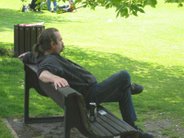From Human, All-Too-Human:
92
How little the world would look moral without forgetfulness! A poet might say that God made forgetfulness the guard he placed at the threshhold of human dignity.
From Mixed Opinions and Maxims:
130
Readers' bad manners.-- A reader is doubly guilty of bad manners against the author when he praises his second book a the expense of the first (or vice versa) and then asks the author to be grateful for that.
137
The worst readers.-- The worst readers are those who proceed like plundering soldiers: they pick up a few things they can use, soil and confuse the rest, and blaspheme the whole.
145
Value of honest books.-- Honest books make the reader honest, at least by luring into the open his hatred and aversion which his sly prudence otherwise knows how to conceal best. But against a book one lets oneself go, even if one is very reserved toward people.
157
Sharpest criticism.-- One criticizes a person, a book, most sharply when one pictures their ideal.
168
Praise of aphorisms.-- A good aphorism is too hard for the tooth of time and is not consumed by all millennia, although it serves every time for nourishment: thus it is the great paradox of literature, the intransitory amid the changing, the food that always remains esteemed, like salt, and never loses its savor, as even that does.
200
Original.-- Not that one is the first to see something new, but that one sees as new what is old, long familiar, seen and overlooked by everybody, is what distinguishes truly original minds. The first discoverer is ordinarily that wholly common creature, devoid of spirit and addicted to fantasy--accident.
251
In parting.-- Not how one soul comes close to another but how it moves away shows me their kinship and how much they belong together.
404
How duty acquires splendor.-- The means for changing your iron duty to gold in everybody's eyes is this: always keep a little more than you promise.
From The Wanderer and His Shadow:
194
Dreams.-- On the rare occasions when our dreams succeed and achiever perfection--most dreams are bungled--they are symbolic chains of scenes and images in place of a narrative poetic language; they circumscribe our experiences or expectations or situations with such poetic boldness and decisiveness that in the morning we are always amazed at ourselves when we remember our dreams. We use up too much artistry in our dreams--and therefore often are impoverished during the day.
202
Tourists.-- They climb mountains like animals, stupid and sweating; one has forgotten to tell them that there are beautiful views on the way up.
203
End and goal.-- Not every end is the goal. The end of a melody is not its goal; and yet: as long as the melody has not reached its end, it also hasn't reached its goal. A parable.
249
Positive and negative.-- This thinker needs nobody to refute him: for that he suffices himself.
297
Not to wish to see too soon.-- As long as one lives through an experience, one must surrender to the experience and shut one's eyes instead of becoming an observer immediately. For that would disturb the good digestion of the experience: instead of wisdom one would acquire indigestion.
302
How one tries to improve bad arguments.-- Some people throw a bit of their personality after their bad arguments, as if that might straighten their paths and turn them into right and good arguments--just as a man in a bowling alley, after he has let go of the ball, still triest to direct it with gestures.
307
When taking leave is needed.-- From what you would know and measure, you must take leave, at least for a time. Only after having left town, you see how high its towers rise above the houses.
323
Remorse.-- Never give way to remorse, but immediately say to yourself: that would merely mean adding a second stupidityto the first.-- If you have done harm, see how you can do good.--If you are punished for your actions, bear the punishment with the feeling that you are doing good--by deterring others from falling prey to the same folly. Every evildoer who is punished may feel that he is a benefactor of humanity.
333
Dying for the "truth."- We should not let ourselves be burnt for our opinions: we are not that sure of them. But perhaps for this: that we may have and change our opinions.


